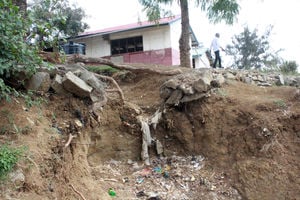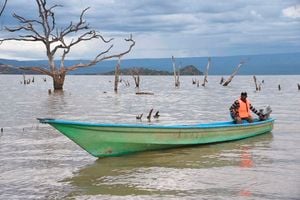
Fishermen with their catch at Kalokol area of Lake Turkana in Turkana County on September 19, 2021.
Water levels on Lake Turkana have risen endangering hundreds of residents along the shores amid fears that nearby Kalokol town may soon be submerged.
Ironically, the lake was previously at risk of drying up due to the construction of Gibe III hydroelectric power dam by the Ethiopian government along river Omo, which is the major source of water.
According to a resident, Raphael Esekon, a fisherman from Kalokol town, since 2020, the shoreline has crept out to more than 1.5 kilometers.
"The reliable fish landing sites on the shores, fish stores, temporary shelters, and shops have all been submerged with thorny thickets of Prosopis Julifulora destroying nets whenever we engage in fishing activities," Mr Esekon said.
The lake was slowly approaching the tarmac road that was constructed to easily transport fresh fish with fears that Kalokol market and town may soon be submerged.
Churches, offices, and schools are also not spared as Kangaki Catholic church has become inaccessible.
Residents of major towns like Lodwar and Kakuma are already feeling the impact of the flooding as evidenced by the increase in prices of fish.
"Fish prices have doubled due to scarcity of fish that has been attributed to the risks fishermen are exposed to while on their fishing expeditions. At the moment we get bigger fish from the Kerio belt as opposed to the Kalokol areas that have been hit hard by floods," Ms Jane Emekwi a fishmonger said.
Mr Ekaale Epakan, an official from Friends of Lake Turkana, which works with communities within the greater Turkana basin on the environment, said Prosopis Julifulora thickets are now becoming a major threat to the lake ecosystem as the easily provide hiding out for crocodiles.
"As part of our efforts to enhance the protection of Lake Turkana and its ecosystem, we began an exercise today to clear Prosopis juliflora. This invasive species has not only overrun the landing sites for most of the beach management units (BMUs) in Kalokol and other locations along the lake but threatening the safety of fishermen," Mr Epakan said.
The flooding has made it difficult for locals to engage in fishing activities, children to access schools, and visitors to tour the beaches.
While calling upon villagers to move to safe grounds he said that affected people are in dire need of humanitarian support as their main source of livelihood has been interrupted rendering hundreds of people, especially in Turkana Central and Turkana North Sub Counties along the fish value chain jobless.
In 2021 a report from the United Nations Environment Programme (UNEP) predicted a far wetter future for Lake Turkana – and possibly a more perilous one for the 15 million people who live on its shores.
The report found that over the next 20 years, climate change could likely lead to heavier rains over Lake Turkana’s river inflows, which would raise water levels in the lake itself and increase the likelihood of severe flooding.
The study urged officials in Kenya and Ethiopia, which both border Lake Turkana, to prepare for a future in which once-rare floods, such as those that hit the region in 2019 and 2020, are regular occurrences.











